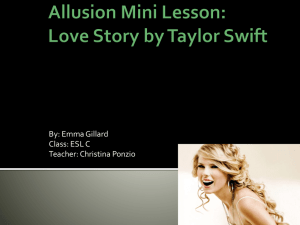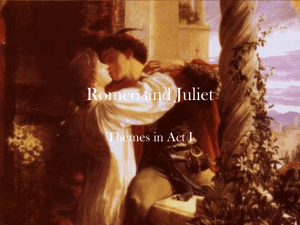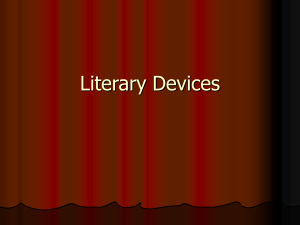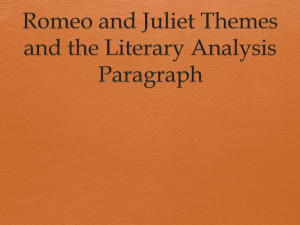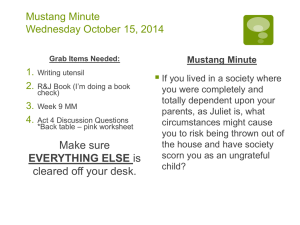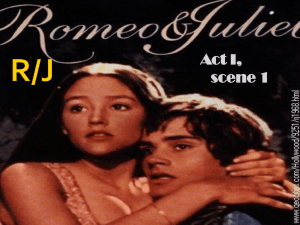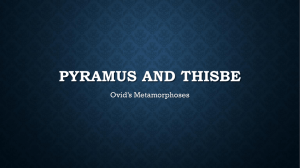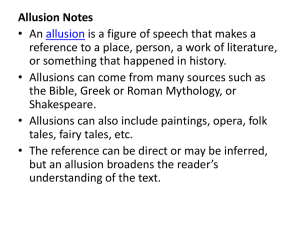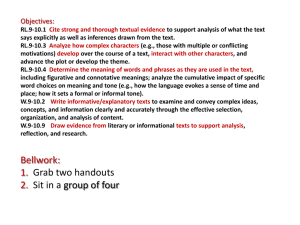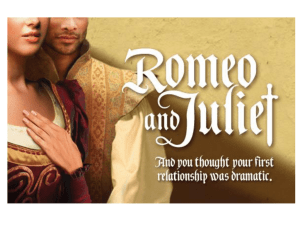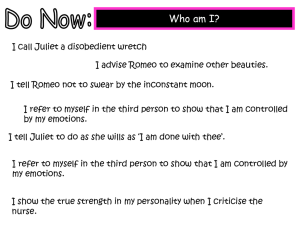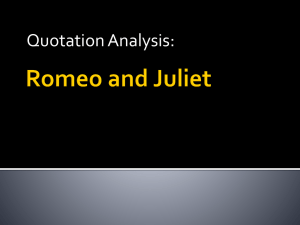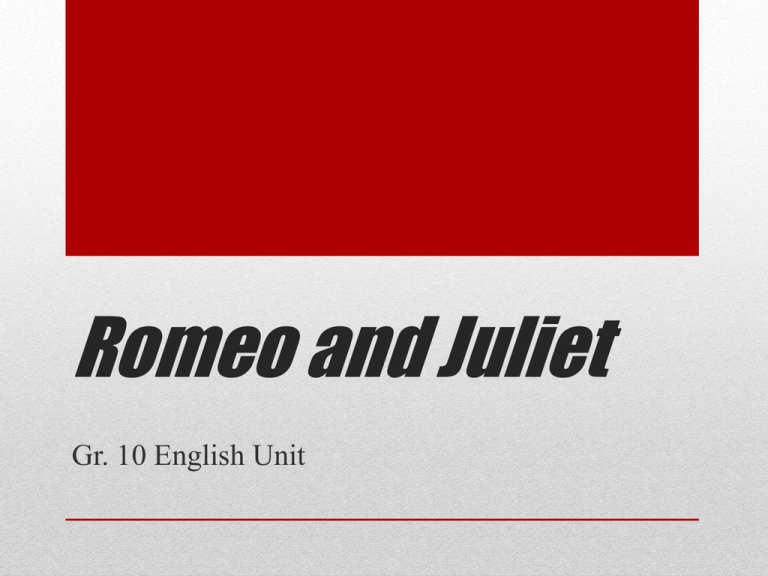
Romeo and Juliet
Gr. 10 English Unit
Setting of the Play
Romeo and Juliet is set in Verona, Italy during the Middle
Ages.
The Middle Ages encompass 1200-1400 A.D.
From 1300-1350 there was a deadly feud between two
families in Florence, Italy: The Cerchi-Donati feud. It
may have been a source of inspiration for Shakespeare.
ACT ONE
Exposition
The exposition
establishes the mood
of the play. The
setting is identified,
as are the main
characters and their
relationships to one
another.
Act I
Exposition
Act I - Exposition
In R+J, the
exposition is from I,I
to I, v.
Act I
Exposition
Act I - Exposition
I, i – Street brawling
in Verona.
I, ii – Romeo
Introduced.
I, iii – Juliet
introduced.
I, iv – Romeo decides
to attend Capulet ball.
I, v – Inciting Force
or Complication:
Romeo meets Juliet at
the ball.
Two households, both alike in dignity,
In fair Verona, where we lay our scene,
From ancient grudge break to new mutiny,
Where civil blood makes civil hands unclean.
From forth the fatal loins of these two foes
A pair of star-cross'd lovers take their life;
Whose misadventured piteous overthrows
Do with their death bury their parents' strife.
The fearful passage of their death-mark'd love,
And the continuance of their parents' rage,
Which, but their children's end, nought could remove,
Is now the two hours' traffic of our stage;
The which if you with patient ears attend,
What here shall miss, our toil shall strive to mend.
Act I, Prologue
1. What is the place setting of the play?
2. What is the relationship between the two households?
3. What does Shakespeare mean by “star-crossed
lovers”?
4. What happens to the lovers?
5. What is the subject matter for this play?
6. What does the chorus ask of the audience in the last
two lines? Why?
I, Prologue
– the poetic form which
7. Act
What
is the name of
Shakespeare uses for the prologue? How many lines
Questions
are there? Note the rhyming pattern.
It takes place in “fair Verona” (Italy).
The two families (“households”) are very similar (“alike in
dignity”), but they are engaged in a bloody feud.
3. “Star-crossed lovers” implies that their love is in defiance of
the divine plan for them, which is written in the stars (i.e.
astrology).
4. They take their lives.
5. The story of their love, in defiance of their parents’ wishes.
6. He asks them to be quiet, so they don’t miss anything; the
actors will over-act parts to try to make the meaning clear, in
Act
Prologue
– hear (because of the noise from the
caseI,some
viewers can’t
pit).
7. Answers
It is a sonnet. There are 14 lines. The rhyme scheme is
ABABCDCDEFEFGG.
1.
2.
Act I, scene i
Exposition
With a partner, write a short skit in which two
characters argue over something (you pick!). The
argument gets heated quickly, and they begin insulting
each other.
Using the Shakespearean insult sheet, script the
argument between the two people. Include at least 10
exchanges
(or 5 lines per
character), and no more than
Shakespearean
Insults
20 exchanges (or 10 lines per character).
Assignment
Some Character Names
One way an author can characterize a character is by giving them a
distinctive name. Below are some examples of how Shakespeare uses
this characterization technique:
Mercutio – Mercury was the messenger of the Gods of the classical
Romans. He was swift, and was the god of communication and speech.
Benvolio – translates from the Italian, “I want the good”.
Tybalt – Mythical King of the Cats.
Escalus – means “scales”. This refers to the scales held in the hands of
Lady Justice.
Paris – The Prince of Troy in Greek mythology who started the Trojan War
by carrying off and marrying Helen, the Queen of the Greeks.
1.
2.
3.
4.
5.
6.
7.
8.
9.
How do the citizens feel about the feud?
Who tries to keep the peace between the two houses?
What does Tybalt’s response tell us about his personality?
What adjective does Benvolio use to characterize Tybalt?
Explain briefly what has just happened to prompt Lady
Montague to comment:
‘Right glad am I he was not at this fray.’ (line 111)
How are Montague, Romeo, and Benvolio related to each
other?
What information do we get about Romeo?
What does Montague say about Romeo?
What is Romeo’s definition of love?
Act I, sc. 1 Questions
Act I, sc. 1 Answers
1.
2.
3.
4.
5.
6.
7.
8.
9.
The citizens are upset about the feud; it disturbs their streets and lives.
Benvolio tries to keep the peace.
Tybalt is very eager to fight Montagues.
Benvolio calls Tybalt “fiery” (line 107).
There was a street fight between the households that got very violent and had to be
broken up by the Prince. Lady Montague is relieved that her son, Romeo, was not at
the fight.
Montague is the head of his household. Romeo is the only son of Montague.
Benvolio is Romeo’s cousin (Montague’s nephew).
Romeo is in love with someone, but is unwilling to tell others about it. He is spending
his nights roaming about sadly, and during the day is shutting himself in his room
with the doors closed and the shades pulled. (See lines 116-139.) He reveals to
Benvolio that the object of his affection is a woman (Rosaline), and that she will have
nothing to do with him. (See lines 205-221.)
Montague is worried about Romeo, and he asks Benvolio to find out the cause of his
sorrow.
According to Romeo, love is “a smoke”, “a fire”, “a sea” of tears; in lines 185-191, he
expresses the view that love is a great thing, but is mostly a source of misery.
The Significance of a Line or Scene in a Play
A line or scene may:
• Reveal character, or show development of character. An early scene
will reveal character traits, which a later scene may develop or change.
• Give background information about events occuring before the action
of a play.
• Give information about events occurring off-stage which cannot be
shown on-stage (or which the director does not wish to show in that
way).
• Present a dramatic contrast in character or mood.
• Advance the plot (significantly).
• Create suspense.
• Establish relationships between characters or show these relationships
changing.
• Afford a relief of tension (often through humour).
• Direct the audience’s sympathies towards OR withdraw them from a
particular character.
• Make a statement on a theme.
• Develop atmosphere or mood.
• Present irony or dramatic irony.
1. What is the Prince’s full name?
2. When the men will not stop fighting, what does he call them?
3. What metaphor does he use to describe their:
a) anger?
b) blood?
4. How many times have they fought recently?
5. What does he give as the cause? (Give a quote and try to explain.)
6. Who, specifically, is the Prince speaking to?
7. How
they pay
if they disturb
the streets
I, iwill
– The
Prince’s
Speech
(Aagain?
Close
8. He sends everyone away except one man – who?
Reading)
9. When does he wish to see Montague?
Partisans
(spear-like
weapons)
1. Prince Escalus is his name. (Escalus = scales, reflecting his role as judge and
law-maker.)
2. He calls them “Rebellious subjects, enemies of peace” and “beasts” (lines 79
and 81).
3. a) anger – “the fire of your pernicious rage” (line 82)
b) blood – “purple fountains issuing from your veins” (line 83)
4. They have “thrice disturb’d” the streets of Verona (so, 3 times) (line 89).
5. He says the fights are stemming from an “airy word” (i.e. some insult one side
made against the other – line 87).
6. He is addressing Capulet and Montague specifically, because they are the
heads of their households, and so responsible for their families’ actions.
7. Those who disturb the peace with fighting will be put to death.
8. Capulet remains with the Prince.
9. He makes an appointment with Montague for the afternoon.
I, i – The Prince’s Speech –
Answers
Act I, scene ii
Exposition
1. What does Paris ask Capulet? Why is Capulet not in
favour of the proposal?
2. How old is Juliet?
3. Explain the quote: “The earth hath swallowed all my
hopes but she.”
4. Why does Romeo want to go to the party at the
Capulets? What is the plan to get into the party,
since he is not invited?
5. What advice does Benvolio give Romeo when the
servant includes Romeo among the invited?
Act I, sc. 2 Questions
Act I, scene iii
Exposition
1. What kind of relationship does Juliet have with her
nurse? What kind of relationship does she have
with her mother?
2. What does the Nurse say about Juliet’s age?
3. Of what does Lady Capulet inform Juliet?
4. How does the Nurse describe Paris?
5. What message does a servant bring?
6. How does Juliet feel about Paris’s desire to marry
her?
Act I, sc. 3 Questions
Act I, scene iv
Exposition
1.
2.
3.
4.
What are the young men preparing for at the beginning of
this scene?
How does Romeo feel about attending the party?
What does Mercutio say about dreams?
What is the purpose of Romeo’s speech at the end of this
scene?
Act I, sc. 4 Questions
Get into groups of 3-5. Get a piece of flipchart paper and some
markers/colored pencils. Using a pencil, divide the page into as
many equal parts as there are people in your group.
Each person must represent a part or parts of the Queen Mab speech on
the piece of flipchart paper. The goal is to fill the page with images
to represent Mercutio’s dream-like imagery.
You do not have to be a great artist! The effect should be a strange mix
ofMercutio’s
images (like the speech)
of various
forms
and appearances. Be
“Queen
Mab”
Speech
creative! Use words, images, symbols, clouds, swirling colours….
Whatever!
The Assignment
object of the assignment is to create an attractive
In-class
collage of images that, at a glance, represent Mercutio’s speech.
Act I, scene v
Rising Action
What is “true love”?
How would you know it if you saw it?
Describe what true love looks like, or at least how it can be
recognized.
Journal Questions
There are three main kinds of love in the play:
1. Courtly Love – An ancient tradition of love-making,
courtly love involved expectations of the male and female.
The female was to play hard-to-get, and the male was
to suffer pain over his unrequited love.
This
is
the
sort
of
love
displayed
by
Romeo
over
Kinds
of
Romantic
Love
in
Rosaline at the start of the play. Nowadays, it is
Romeoconsidered
and Juliet
generally
an immature way of displaying
affection (like “infatuation”).
There are three main kinds of love in the play:
2. Physical Love – The physicality of love, including sex
and sexuality. Gender role expectations included that
women of good Christian breeding would deny themselves
any pleasure from this; it was more expected of men.
This
is
the
sort
of
“love”
displayed
by
Mercutio
and
Kinds
Romantic
Love
in
Juliet’s Nurse in the play. Nowadays, this is generally
Romeoaand
Julietsort of affection, but is not “true
considered
legitimate
love” per se (more like “lust”).
There are three main kinds of love in the play:
3. True Love – This is love of the all-consuming sort that
combines body, mind, and ”spirit”. The “spiritual”
aspect of this sort of love makes it “superior” to the other
types, and it is portrayed as such in the play, although it is
also portrayed as dangerous.
This is the sort of “love” displayed by Romeo and Juliet
ofNowadays,
Romantic
Love
in debate whether “true
inKinds
the play.
most
people
love” actually exists, but in Shakespeare’s day it was
Romeoaand
considered
very Juliet
real phenomenon.
Masquerades were amusement for people in the
Middle Ages. They were usually big, private affairs,
involving lots of food, wine, music, and especially
dancing.
The masks were for fun and disguise, but also
A Notepeople
About
allowed
to behave in ways they could not
normally
behave, because
Masquerade
Balls of the “protection” the
mask allowed.
1.
2.
3.
4.
Where does this scene take place?
What are the serving-men talking about?
What kind of host is Capulet?
Describe the events of Romeo and Juliet’s first
meeting. What style of writing has Shakespeare
chosen for this passage? Why?
5. Who objects to Romeo’s presence, and what does
he say? Find one quotation to illustrate his attitude
towards Romeo.
6. What is the dramatic purpose of the quarrel between
Capulet and Tybalt?
Act I, sc. 5 Questions
ACT TWO
Rising Action
Act II
Rising Action
Act I
Exposition
The rising action
delivers a build-up
of tension as the plot
and sub-plots begin
to develop, and the
conflicts grow.
In R+J, the rising
action is from I,iv to
III, i.
Act II – Rising Action
Act II
Rising Action
Act I
Exposition
I, v – Inciting Force or
Complication: Romeo
and Juliet meet at the
masked ball.
II, i and ii – Meeting in
Capulet’s orchard.
II, iii – Romeo meets
Friar Lawrence.
II, iv – Romeo meets
with Nurse.
II, v – Juliet discusses
with the Nurse.
II, vi – Friar Lawrence
marries Romeo and
Juliet.
III, i – Climax; Deaths.
Act II – Rising Action
1.
What description of Romeo’s love does Mercutio give?
Act II, sc. 1 Questions
Act II, sc. ii
1. To whom does Romeo allude when he says, “He
jests at scars…”?
2. In his soliloquy, how does Romeo greet Juliet?
3. What description of Juliet does he give?
4. Who interrupts the scene?
5. Do they exchange “love’s faithful vows”?
6. What arrangements do they make for future
meetings?
7. What line expresses their difficulty in parting?
8. What is the dramatic purpose of Romeo’s
decision/announcement after Juliet leaves a second
time?
Act II, sc. 2 Questions

